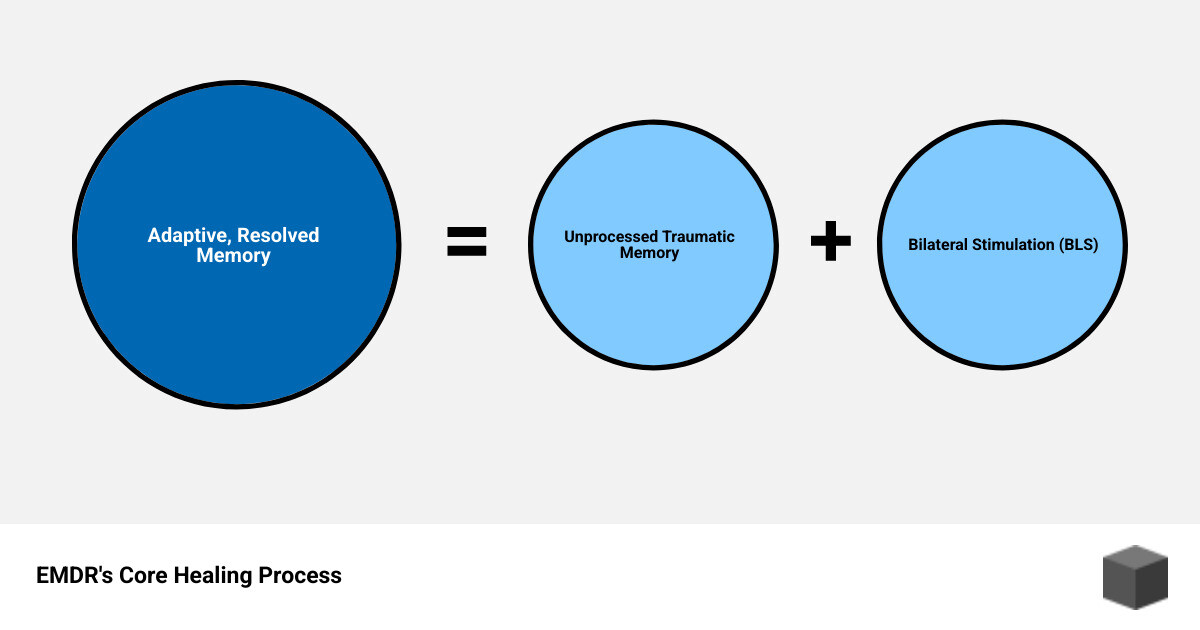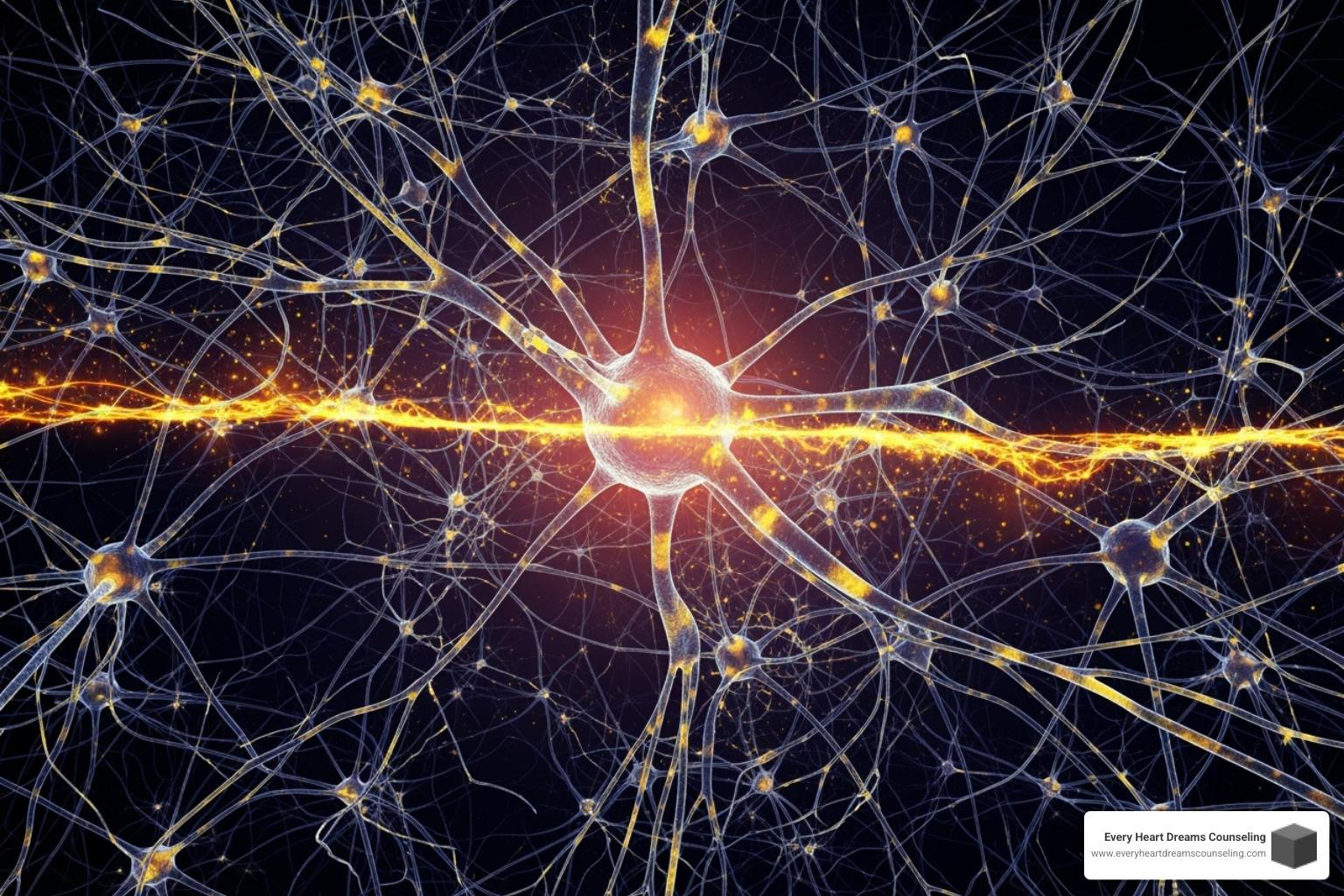Understanding EMDR Therapy: Your Path to Healing Trauma in El Dorado Hills

If you're seeking effective treatment for processing disturbing life experiences and traumatic memories, EMDR therapy offers a proven, scientifically-backed approach to healing. This innovative trauma treatment helps your brain naturally process traumatic memories, allowing you to remember past events without the overwhelming emotions that once accompanied them.
At Every Heart Dreams Counseling, our group practice in El Dorado Hills specializes in personalized mental health care, including EMDR therapy. Our team of licensed therapists is dedicated to helping teens, adults, children, and families navigate mental health conditions through our integrated trauma therapy approach, tailored specifically to each individual's unique healing journey.
What Is EMDR Therapy?
EMDR therapy (Eye Movement Desensitization and Reprocessing) is a structured therapy approach that helps people heal from the emotional distress of traumatic experiences. This movement desensitization and reprocessing therapy was developed by Dr. Francine Shapiro in the late 1980s and represents an effective treatment that uses bilateral stimulation—typically rhythmic eye movements—to help your brain reprocess trauma memory and reduce emotional intensity.
The goal of EMDR treatment is to reduce the vividness and emotional charge of disturbing memories, helping you feel more empowered and at peace. Rather than erasing traumatic memories, EMDR therapy helps your brain process them through the natural healing process, so they no longer cause overwhelming distress in your daily life.
How EMDR Therapy Heals the Brain Through Processing Emotional Memories
When a traumatic event occurs, the trauma memory can become "stuck" or stored incorrectly in your brain, leading to distressing emotions, negative thoughts, and physical sensations long after the disturbing event is over. EMDR therapy engages your brain's natural healing process through bilateral stimulation, which helps restart the processing system that psychological trauma may have disrupted.
This gentle, rhythmic stimulation through eye movements helps both sides of the brain complete the processing that was interrupted during the traumatic experience. As a result, traumatic memories can be stored in a way that no longer causes deep emotional distress, allowing for significant relief from psychological pain through successful treatment.

The Science Behind EMDR: Adaptive Information Processing Model
The theoretical foundation of desensitization and reprocessing EMDR is the Adaptive Information Processing model. This model suggests that our brains are naturally wired to process experiences and store them in a helpful, adaptive way. However, psychological trauma can overwhelm this system, causing traumatic memories—along with their associated emotions and body sensations—to become "frozen in time."
These unprocessed traumatic memories can be triggered in the present moment, making it feel as if the traumatic experience is happening all over again. EMDR therapy helps restart your brain's natural healing process, allowing these stuck memories to be properly integrated and reducing their emotional impact through targeted EMDR processing.
The Eight Phase Treatment Approach: A Personalized EMDR Protocol
EMDR therapy follows a comprehensive eight-phase protocol that is always customized to your individual mental health needs and circumstances. Your therapist at our El Dorado Hills group practice will guide you through each phase at a pace that feels comfortable and safe for you during every EMDR session.
Phase 1 & 2: Building Your Foundation for EMDR Treatment
History-Taking and Treatment Planning: We begin by understanding your unique background, current mental health conditions, and treatment goals. This collaborative process helps us identify specific targeted memory that may be contributing to your current emotional distress.
Preparation and Resource Building: We equip you with personalized coping strategies and stress-reduction techniques, such as calming imagery and grounding exercises. This ensures you feel prepared and empowered to manage any emotions or body sensations that may arise during EMDR processing.
Phases 3-6: Active Memory Processing Through Eye Movement Desensitization
Assessment: We identify the targeted memory's most disturbing image, related negative beliefs about yourself, and associated emotions and physical sensations. We also establish positive belief statements you'd prefer to hold about yourself.
Desensitization: You focus on the traumatic memory while engaging in bilateral stimulation through eye movements. This EMDR processing is repeated until the memory's emotional charge significantly decreases.
Installation: We strengthen positive belief systems about yourself using bilateral stimulation, helping you internalize healthier perspectives through movement desensitization and reprocessing.
Body Scan: We ensure any residual physical sensations or discomfort related to the trauma memory is identified and resolved.
Phases 7 & 8: Integration and Stability in EMDR Practice
Closure: Each EMDR session ends with grounding exercises to help you feel stable and calm, regardless of whether a traumatic memory has been fully processed.
Re-evaluation: At the beginning of subsequent EMDR therapy sessions, we assess your progress and ensure lasting positive outcomes, adjusting your EMDR treatment plan as needed.

Who Can Benefit from EMDR Therapy?
While EMDR therapy is renowned for treating Post-Traumatic Stress Disorder and adult posttraumatic stress disorder, its applications extend to a wide range of mental health conditions. Our group practice provides personalized EMDR treatment for individuals dealing with various types of psychological trauma and emotional distress.
Trauma Treatment and PTSD
EMDR therapy is recognized by major health organizations worldwide as a first-line treatment for Post-Traumatic Stress Disorder. Extensive randomized controlled trial studies have demonstrated its effectiveness for treating trauma, and clinical practice consistently shows positive outcomes for treating PTSD. EMDR treatment is particularly effective for:
- Single-Incident Trauma: Such as accidents, natural disasters, or assaults that create disturbing events in memory
- Complex Trauma: Including adverse childhood experiences that shape traumatic memories and worldview
- First Responders: Helping those who regularly encounter traumatic experiences in their work
- Survivors of Abuse: Addressing both traumatic memories and negative belief systems that often result
Beyond Trauma: Additional Mental Health Applications
The healing power of EMDR therapy extends to mental health conditions stemming from unresolved distressing life experiences or negative belief patterns:
- Anxiety Disorders and Phobias: By addressing root traumatic experiences that created patterns of fear and emotional distress
- Depression: Particularly when connected to unresolved grief or negative positive belief systems
- Complicated Grief: When the grieving process becomes stuck due to traumatic aspects of loss
- Performance Anxiety: Helping individuals overcome blocks rooted in past failures through effective treatment
- Chronic Pain: Especially when pain is linked to a traumatic injury and associated traumatic memories
Whether you're seeking counseling for teens, young adults, adults, children, or family counseling, our group practice can determine if EMDR therapy is an appropriate component of your personalized mental health treatment plan.
What to Expect from a Typical EMDR Therapy Session
Understanding the EMDR processing can help you feel more confident about beginning your healing journey. EMDR treatment is backed by extensive scientific research from randomized controlled trial studies and professional recognition in clinical practice.
Scientific Foundation and Recognition for Treating Trauma
The effectiveness of EMDR therapy for treating trauma and Post-Traumatic Stress Disorder is supported by more than 30 controlled outcome studies and numerous randomized controlled trial investigations. It is recognized as an effective treatment by:
- The World Health Organization (WHO)
- The American Psychiatric Association (APA)
- The U.S. Department of Veterans Affairs and Department of Defense
This widespread recognition from the World Health Organization, American Psychiatric Association, and Veterans Affairs underscores the scientific validity and therapeutic value of EMDR practice for mental health conditions.
Session Structure and Timeline for EMDR Treatment
A typical EMDR therapy session lasts 60 to 90 minutes, allowing sufficient time for EMDR processing while ensuring you feel grounded before leaving. The total number of EMDR therapy sessions varies based on your individual mental health needs and treatment goals:
- Single traumatic events may be resolved in fewer sessions, typically 3 to 6 EMDR sessions
- More complex mental health conditions may require 8 to 12 sessions or more
- Your EMDR treatment timeline is always personalized to your unique healing journey
One appealing aspect of EMDR therapy is that it generally doesn't require homework between sessions, as the deep EMDR processing occurs within each EMDR session itself. You maintain complete control throughout the process and can pause at any time during your EMDR treatment.
The EMDR Processing: What Happens During Treatment Sessions
During EMDR therapy sessions, you'll work with your therapist to recall specific traumatic memories while simultaneously experiencing bilateral stimulation. This might involve following your therapist's fingers with your eyes through eye movements, listening to alternating sounds, or feeling gentle taps.
This process of movement desensitization and reprocessing helps your brain naturally process and integrate traumatic memories through the natural healing process, reducing their emotional intensity and allowing new, healthier positive belief systems to emerge. Many clients find this approach to processing emotional memories less overwhelming than detailed verbal recounting of traumatic experiences.
Preparing for Your EMDR Treatment Journey
Embarking on EMDR therapy is a significant step toward healing from mental health conditions and traumatic memories. Preparation helps maximize the benefits of this effective treatment approach for psychological trauma.
Before beginning EMDR treatment, consider reflecting on the distressing life experiences or PTSD symptoms you hope to address. Be open to discussing these with your therapist, as this information helps create your personalized EMDR protocol. Understanding the EMDR processing and the role of eye movements and bilateral stimulation can help you feel more comfortable and confident.
Most importantly, finding a qualified therapist who is experienced in treating trauma and EMDR practice is essential for successful treatment outcomes in addressing mental health conditions.
Safety and Considerations in EMDR Practice
Your safety and well-being are our highest priorities during EMDR treatment. EMDR therapy has an excellent safety profile when provided by properly trained professionals in clinical practice. Our therapists at Every Heart Dreams Counseling have completed comprehensive, specialized training through accredited organizations, ensuring you receive qualified, professional care for your mental health conditions.
During EMDR sessions, it's normal to experience temporary increases in emotional distress as your brain processes traumatic memories through the natural healing process. This is actually a sign that the EMDR processing is working effectively. These feelings are typically brief, and your therapist is trained to help you navigate them without feeling overwhelmed.
The preparation phases of EMDR treatment are designed for your safety and comfort. We take considerable time to build your emotional resources and coping skills before beginning active processing emotional memories, ensuring you feel prepared and capable throughout your healing journey.
Finding the Right EMDR Therapist for Mental Health Treatment
Choosing an experienced EMDR therapist is crucial for your healing journey, especially when addressing Post-Traumatic Stress Disorder, traumatic memories, and other mental health conditions. Look for practitioners who are certified or recognized by reputable organizations such as the EMDR International Association, ensuring they have specialized training in the EMDR protocol and treating trauma.
A qualified EMDR therapist should create a supportive environment where you can process traumatic experiences through movement desensitization and reprocessing at your own pace. They should be skilled in helping you manage emotional distress and body sensations that may arise during EMDR treatment, ensuring you feel grounded and empowered throughout the process.
At our group practice, our therapists integrate EMDR therapy with other evidence-based approaches as appropriate, including our specialized modalities such as DBT therapy, brainspotting, trauma-informed yoga, and Internal Family Systems. This integrated approach ensures your mental health treatment plan is truly personalized to your specific needs and circumstances.

EMDR Therapy at Every Heart Dreams Counseling
Our group practice in El Dorado Hills is committed to providing trauma-informed care through our integrated trauma therapy approach. We believe that healing from psychological trauma and mental health conditions is not only possible but achievable through personalized, evidence-based EMDR treatment.
Our team understands that every individual's experience with traumatic memories is unique, which is why we never take a one-size-fits-all approach to mental health care. Instead, we work collaboratively with you to develop an EMDR treatment plan that honors your specific needs, circumstances, and goals. Whether you're dealing with recent psychological trauma, childhood experiences, or ongoing mental health conditions, we tailor our EMDR practice to support your individual healing journey.
We offer specialized services including counseling for teens, counseling for young adults, counseling for adults, family counseling, and child counseling. Our therapists are experienced in treating trauma, relationship struggles, and helping individuals and families navigate mental health conditions through effective treatment approaches.
The Natural Healing Process Through EMDR Treatment
EMDR therapy works by activating your brain's natural healing process, allowing traumatic memories to be processed in a healthier way. During EMDR processing, the bilateral stimulation through eye movements helps both hemispheres of your brain work together to integrate disturbing events and reduce their emotional impact.
This natural healing process allows traumatic memories to lose their overwhelming emotional charge while preserving the factual information. Through EMDR treatment, you can develop stronger positive belief systems about yourself and your ability to cope with life's challenges, leading to lasting emotional relief and improved mental health.
Taking the First Step Toward Healing
EMDR therapy offers a scientifically-proven pathway to help your brain naturally heal from traumatic memories and mental health conditions. Through this evidence-based approach to treating trauma, disturbing events can become integrated parts of your past without their overwhelming emotional charge.
At Every Heart Dreams Counseling, we believe that everyone deserves to live free from the burden of unprocessed traumatic memories and mental health conditions. Our goal is to help you build healthier relationships with yourself, others, and your past while fostering deep self-compassion and resilience through effective treatment.
We are proud to serve the El Dorado Hills community and extend our support to individuals and families in Cameron Park, Placerville, Folsom, and Sacramento. If you're feeling stuck or curious about how EMDR therapy could help you move toward a more peaceful, empowered future through treating trauma and improving mental health, we invite you to reach out to our group practice.
Contact us today to learn more about our personalized approach to EMDR treatment and to discuss whether EMDR therapy might be an appropriate component of your healing journey. Remember, seeking help for mental health conditions is a sign of strength, and taking this first step demonstrates your commitment to your own well-being and growth.
For more information about our integrated trauma therapy approach and to schedule a consultation for EMDR treatment, please visit our website or contact our El Dorado Hills office directly.


